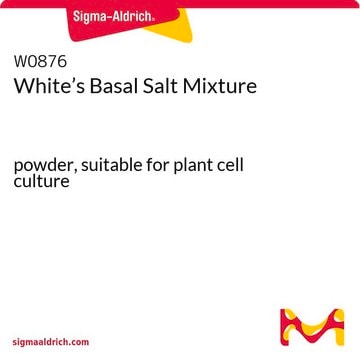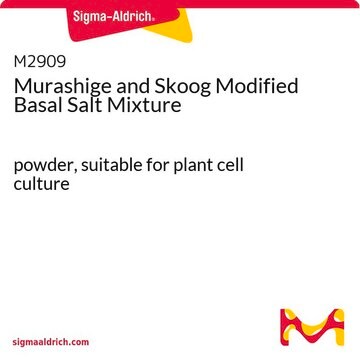H2395
Hoagland′s No. 2 Basal Salt Mixture
powder, suitable for plant cell culture
Synonym(s):
Hoagland solution 2
Sign Into View Organizational & Contract Pricing
All Photos(1)
About This Item
UNSPSC Code:
12352207
NACRES:
NA.72
Recommended Products
form
powder
Quality Level
technique(s)
cell culture | plant: suitable
application(s)
agriculture
storage temp.
2-8°C
Application
Hoagland′s No. 2 Basal Salt Mixture has been used:
- in the preparation of Hoagland′s solution for treating root tips
- to grow maize (Zea mays L.) seeds
- to grow rice seedlings and to treat M. sinensis (cv. Kosung) seedlings hydroponically
Hoagland′s No. 2 Basal Salt Mixture is a classic plant medium. Hoagland′s solution is a popular solution for a wide variety of plant species.
Formula variant
Quantity
Formulated to contain 1.6 grams of powder per liter of medium.
related product
Product No.
Description
Pricing
Signal Word
Danger
Hazard Statements
Precautionary Statements
Hazard Classifications
Acute Tox. 4 Oral - Eye Dam. 1 - Ox. Sol. 3
Storage Class Code
5.1B - Oxidizing hazardous materials
WGK
WGK 2
Flash Point(F)
Not applicable
Flash Point(C)
Not applicable
Certificates of Analysis (COA)
Search for Certificates of Analysis (COA) by entering the products Lot/Batch Number. Lot and Batch Numbers can be found on a product’s label following the words ‘Lot’ or ‘Batch’.
Already Own This Product?
Find documentation for the products that you have recently purchased in the Document Library.
Customers Also Viewed
Kumudini M Meepagala et al.
ACS omega, 6(1), 401-407 (2021-01-19)
Bioassay-guided fractionation of the ethyl acetate extract of Amyris elemifera leaves was carried out to identify phytotoxic and antifungal constituents. A novel phytotoxic furanocoumarin 8-(3-methylbut-2-enyloxy)-marmesin acetate (1) and its deacyl analog 8-(3-methylbut-2-enyloxy)-marmesin (2) were isolated. The X-ray crystal structure determination
Dongling Mou et al.
Ecotoxicology and environmental safety, 74(4), 776-786 (2010-11-16)
The cuttings of grape (Vitis vinifera Linn.) were exposed to Hoagland's solution containing five different manganese (Mn) concentrations to investigate Mn toxicity and the possible detoxifying responses. Three genotypes (i.e. cultivars Combiner, Jingshou and Shuijing) were used in present study.
The water-culture method for growing plants without soil.
Hoagland, D.R., and Arnon, D.I.
Univ. Calif. Coll. Agric. Exp. Sta. Circ., 347-353 (1938)
Yunying Fang et al.
Global change biology, 24(7), 2775-2790 (2018-04-01)
Agronomic practices such as crop residue return and additional nutrient supply are recommended to increase soil organic carbon (SOC) in arable farmlands. However, changes in the priming effect (PE) on native SOC mineralization in response to integrated inputs of residue
Kristina M Mahan et al.
Journal of industrial microbiology & biotechnology (2018-06-20)
Livestock and fish farming are rapidly growing industries facing the simultaneous pressure of increasing production demands and limited protein required to produce feed. Bacteria that can convert low-value non-food waste streams into singe cell protein (SCP) present an intriguing route
Our team of scientists has experience in all areas of research including Life Science, Material Science, Chemical Synthesis, Chromatography, Analytical and many others.
Contact Technical Service
















